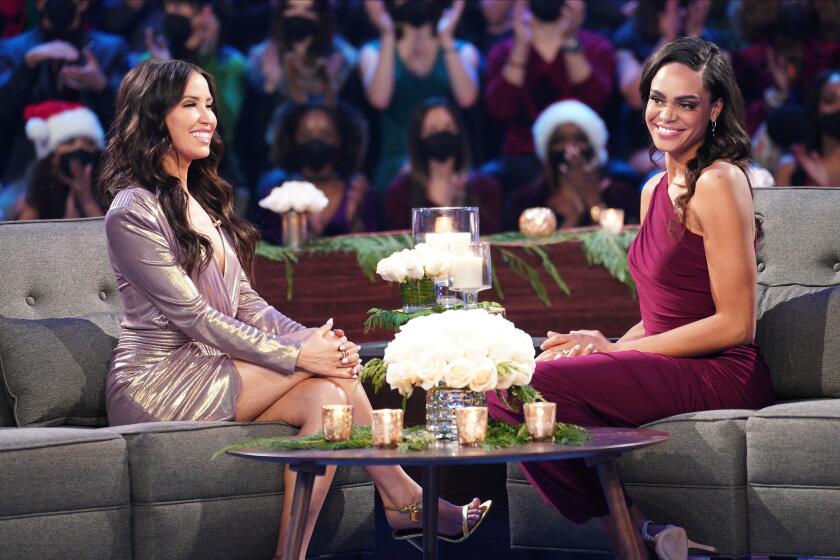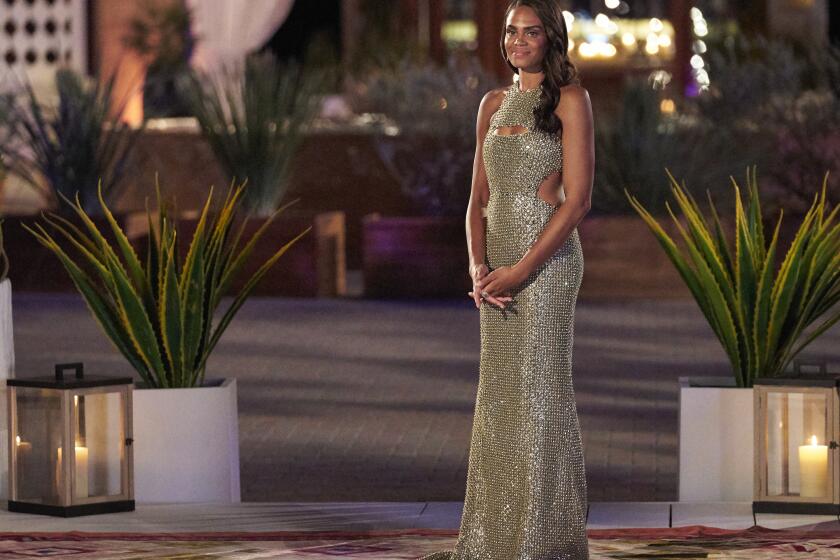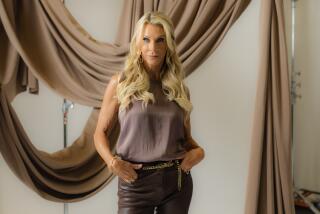The ‘Bachelor’ franchise made strides on diversity — until an ‘infuriating’ setback
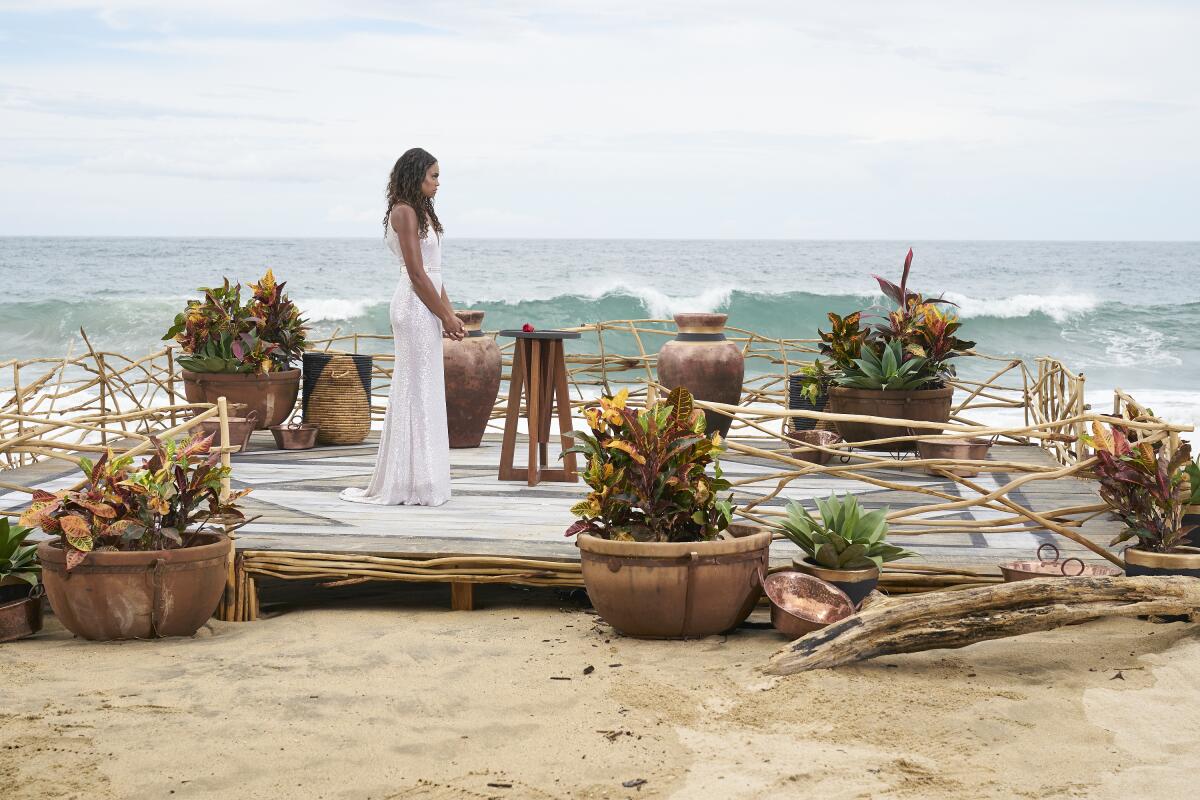
The following contains spoilers about the season finale of “The Bachelorette.”
In between the declarations of love and the engagement and the lush soundtrack and the final rose, “The Bachelorette” made history.
In the season finale of ABC’s hit reality show, Michelle Young got engaged to Texas sales executive Nayte Olukoya. The Minnesota elementary school teacher chose Olukoya over a heartbroken Brandon Jones, who made an emotional plea last week to Young not to send him home.
Producers of the live ‘Bachelorette’ reunion special ‘After the Final Rose’ changed their COVID-19 regulations midshow after a Twitter backlash.
Young and Olukoya’s love story was also a breakthrough for the “Bachelor” franchise, which has been rocked repeatedly by charges of racism and cultural insensitivity. The finale marked the first time in its 19-year history that a Black lead has selected a Black contestant as their soulmate.
The previous Black stars — Rachel Lindsay, Tayshia Adams and Matt James — all chose mates who are white from culturally diverse groups of suitors.
The complete guide to home viewing
Get Screen Gab for everything about the TV shows and streaming movies everyone’s talking about.
You may occasionally receive promotional content from the Los Angeles Times.
This season was already a milestone for the “Bachelor” franchise. For the first time, a season featured a Black lead, a Black co-host — Adams — and a Black executive producer, Jodi Baskerville. Another defining moment came later in the season when the four finalists competing for Young’s affections were all Black.
Such developments might have produced optimism that producers had moved beyond the racially charged scandal that clouded the most recent season of “The Bachelor,” which starred James as the flagship’s first Black male lead and ended with the departure of host Chris Harrison.
Instead of a happy ending, though, loyal members of Bachelor Nation are disappointed enough to threaten a boycott of the franchise.
At issue is the selection of former football player Clayton Echard as the star of the landmark 20th anniversary season of “The Bachelor,” which premieres Jan. 3. Fans claim that the all-Black field of finalists from Young’s season were passed over by producers in favor of the Missouri-based Echard, a medical sales rep who was eliminated by Young in Episode 6, before seven other suitors.
For the first time, a franchise rocked by charges of racism will have a Black lead, co-host and executive producer. And it could be a game changer.
Warner Bros., which produces the series, pointed out that several leads — including James; Young’s predecessor, Katie Thurston; and Juan Pablo Galavis, the first Latino Bachelor — have come from outside the pool of finalists. But multiple fans told The Times they interpreted Echard’s selection as a pointed departure from the prevailing tradition.
“There have been these moments of relief and surprise that made it seem like things were really going to change for the better,” said Myah Genung, who has been watching the “Bachelor” franchise since she was a teenager. “But that has been immediately followed by disappointment and a reversal to the status quo, where there are glaring signs that they’re privileging white men.”
“There were these fantastic Black men at the end for Michelle, but it’s as clear as day that producers don’t want this to be known as ‘the Black show,’” Genung added. “All of the energy that we as a Black fan base have put in wanting this show to change and be better has been for naught. Michelle’s season has been wonderful to watch, but I’m definitely not going to watch Clayton’s season.”
Diane Castro, a corporate communications executive who has also been watching “The Bachelor” from the beginning, said, “After what happened with Matt’s season, the Black Lives Matter movement and the pledges for change, to revert to the old formula is very disappointing. It’s infuriating that the ‘Bachelor’ house still looks like Barbie’s beach house circa 1975.”
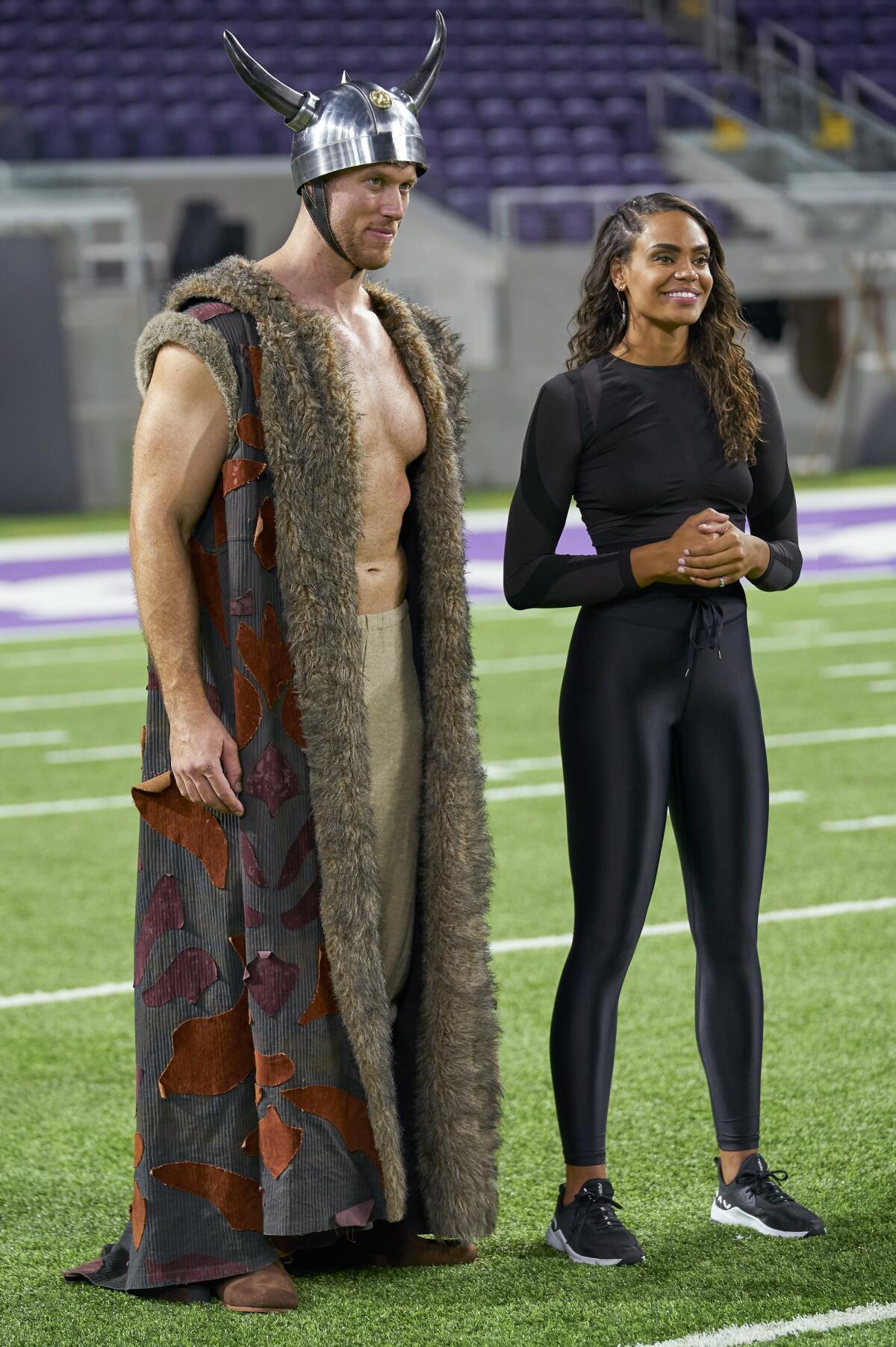
The premiere of Young’s season drew 3 million viewers — the show’s least watched premiere ever, according to the Hollywood Reporter. And though there are several potential reasons for the decline, including ABC’s decision to air back-to-back seasons of “The Bachelorette,” fans have speculated that the franchise’s increased emphasis on diversity, with three Black leads out of the last four, may have alienated a certain subset of viewers.
“There are two audiences for this show — those who want to see diverse love stories and those who don’t want to see a story that doesn’t look like them, that doesn’t resonate with them,” said longtime fan Ashley Tabron. “We’ve seen what’s possible when you have Black people at the center. To take that away abruptly hurts. I don’t see them returning to a Black lead like Michelle or Matt for a very long time.”
Other Black fans who have been rooting for a Black love story say Echard’s selection is the right move — in order to prevent a repeat of James’ disastrous season.
“They tried it with Matt James, and it was a disaster,” said Justine Kay, who hosts the “Bachelor”-themed podcast “2 Black Girls, 1 Rose” with friend Natasha Scott. “They had a real difficult time handling a Black man’s story. If they are going to do what they did to Matt, it’s better not to do it. It was bad for everyone involved.”
After pledging ‘real change’ amid last year’s protests, ABC and owner Walt Disney Co. stayed silent as a firestorm over race consumed its reality-TV flagship.
James had his season turned upside down when photographs surfaced of eventual winner Rachael Kirkconnell at an antebellum South-themed party. Harrison was swept up in the firestorm when he defended Kirkconnell in a controversial interview on “Extra” with Lindsay, the first Black lead in franchise history. James also spoke out during the season, saying the controversy was reflective of a larger issue “that the franchise has fallen short of addressing adequately for years.”
Kay said she and Scott were looking forward to going back to their original approach of being more lighthearted in discussing the shows: “We’re going to have more fun.”
News about Echard being the new Bachelor leaked even before Young’s season premiered. “That was jarring,” Genung said. “But then it was like, ‘Wow, this guy must have a fantastic storyline. He must be a standout among the rest of the guys.’ So we waited for the justification of why producers would pick him. But that breakout moment never came. He looks literally like every other Bachelor.”
In the sixth episode, Echard was positioned as a hit with some of Young’s fifth-grade students, who picked him to go on a one-on-one date with Young. Although Young told him he had many admirable qualities, she did not feel they were a good match and sent him home.
“My heart is telling me that Clayton is a truly wonderful person,” she said in a voice-over. “He’s just not my person. But I know there’s somebody out there that is going to be absolutely amazing for him.”
Race was a dominant throughline during the season, with Young repeatedly identifying herself as a strong Black woman who had endured a number of painful moments, including being called the N-word by a woman in a grocery store.
During a spoken-word session, she recited a poem in which she said that “early on, society coined me as the token Black girl. I was their stamp on diversity, all thanks to my nappy curls. ... I was never the girl invited to cute dates at the apple orchard in the fall. I was the girl picked last for prom, but the first for basketball.”
For ‘The Bachelorette’ and ‘Big Brother,’ two series with fraught histories around race, meaningful treatment of the subject has been a challenge.
One tense moment erupted when a contestant circulated a rumor that Young was spotted before the show having dinner with “a light-skinned baller.” Upset by the speculation, Young told her suitors, “If I’m having a romantic dinner with a white guy at a restaurant, no one would say, ‘They’re a couple.’ But because it’s another Black man, we’re supposed to be together. And it’s frustrating, because I’m open to all of you.”
“There were much more substantial conversations about race than I’ve ever heard on the franchise,” Castro said of Young’s season, which is why she’s not ready to quit “The Bachelor” just yet. She hopes that the franchise will further expand whom it features as romantic leads, including not only Black people but also Latinos and other participants of color.
“To not do that,” she said, “is a missed opportunity.”
More to Read
The complete guide to home viewing
Get Screen Gab for everything about the TV shows and streaming movies everyone’s talking about.
You may occasionally receive promotional content from the Los Angeles Times.
